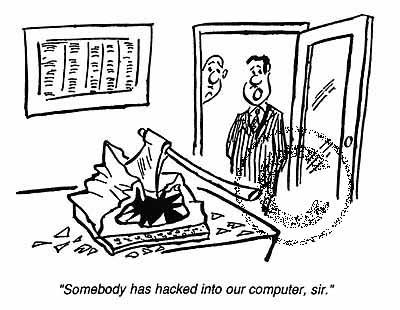:cracker: n. One who breaks security on a system. Coined ca. 1985
by hackers in defense against journalistic misuse of {hacker}
(q.v., sense

. An earlier attempt to establish `worm' in this
sense around 1981--82 on USENET was largely a failure.
Use of both these neologisms reflects a strong revulsion against
the theft and vandalism perpetrated by cracking rings. While it is
expected that any real hacker will have done some playful cracking
and knows many of the basic techniques, anyone past {larval
stage} is expected to have outgrown the desire to do so except for
immediate practical reasons (for example, if it's necessary to get
around some security in order to get some work done).
Thus, there is far less overlap between hackerdom and crackerdom
than the {mundane} reader misled by sensationalistic journalism
might expect. Crackers tend to gather in small, tight-knit, very
secretive groups that have little overlap with the huge, open
poly-culture this lexicon describes; though crackers often like to
describe *themselves* as hackers, most true hackers consider
them a separate and lower form of life.
Ethical considerations aside, hackers figure that anyone who can't
imagine a more interesting way to play with their computers than
breaking into someone else's has to be pretty {losing}. Some
other reasons crackers are looked down on are discussed in the
entries on {cracking} and {phreaking}. See also
{samurai}, {dark-side hacker}, and {hacker ethic,
the}.
:cracking: n. The act of breaking into a computer system; what a
{cracker} does. Contrary to widespread myth, this does not
usually involve some mysterious leap of hackerly brilliance, but
rather persistence and the dogged repetition of a handful of fairly
well-known tricks that exploit common weaknesses in the security of
target systems. Accordingly, most crackers are only mediocre
hackers.
:hacker: [originally, someone who makes furniture with an axe] n.
1. A person who enjoys exploring the details of programmable
systems and how to stretch their capabilities, as opposed to most
users, who prefer to learn only the minimum necessary. 2. One who
programs enthusiastically (even obsessively) or who enjoys
programming rather than just theorizing about programming. 3. A
person capable of appreciating {hack value}. 4. A person who is
good at programming quickly. 5. An expert at a particular program,
or one who frequently does work using it or on it; as in `a UNIX
hacker'. (Definitions 1 through 5 are correlated, and people who
fit them congregate.) 6. An expert or enthusiast of any kind. One
might be an astronomy hacker, for example. 7. One who enjoys the
intellectual challenge of creatively overcoming or circumventing
limitations. 8. [deprecated] A malicious meddler who tries to
discover sensitive information by poking around. Hence `password
hacker', `network hacker'. The correct term is {cracker}.
The term `hacker' also tends to connote membership in the global
community defined by the net (see {network, the} and
{Internet address}). It also implies that the person described
is seen to subscribe to some version of the hacker ethic (see
{hacker ethic, the}.
It is better to be described as a hacker by others than to describe
oneself that way. Hackers consider themselves something of an
elite (a meritocracy based on ability), though one to which new
members are gladly welcome. There is thus a certain ego
satisfaction to be had in identifying yourself as a hacker (but if
you claim to be one and are not, you'll quickly be labeled
{bogus}). See also {wannabee}.


/i/2001894471.png?f=fpa)